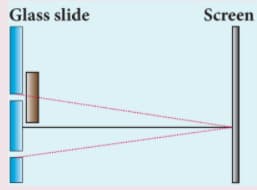Coherent and Incoherent Addition of Waves
Coherent and Incoherent Addition of Waves: Overview
This topic covers concepts such as Coherence of Light Waves, Monochromatic Light Waves, Principle of Superposition, Phase of Waves, Path Difference and Phase Difference, Resultant Amplitude and Intensities, etc.
Important Questions on Coherent and Incoherent Addition of Waves
In Young’s double slit experiment, the two slits 0.15 mm apart are illuminated by monochromic light of wavelength 450 nm. The screen is 1.0 m away from the slits.
(a) Find the distance of the second (i) bright fringe, (ii) dark fringe from the central maximum.
Which of the following expressions is/are correct for Young’s experiment?
(i) condition for bright fringes
(ii) condition for dark fringes
ii) fringe width
A point source emits sound equally in all directions in a non-absorbing medium. Two points P and Q are at a distance of 9 metres and 25 metres respectively from the source. The ratio of amplitudes of the waves at P and Q is ___________
A point source emits sound equally in all directions in a non-absorbing medium. Two points P and Q are at a distance of 9 metres and 25 metres respectively from the source. The ratio of amplitudes of the waves at P and Q is ___________
Two beams of light having intensities I and 4I interfere to produce a fringe pattern on a screen. The phase difference between the beams is at point A and at point B. Then the difference between the resultant intensities at A and B is
A thin slice is cut out of a glass cylinder along a plane parallel to its axis. The slice is placed on a flat glass plate as shown in figure. The observed interference fringes from this combination shall be

Two coherent monochromatic light beams of intensities and are superposed. The maximum and minimum possible intensities in the resulting beam are
Two coherent monochromatic light beams of intensities and are superposed. The maximum and minimum possible intensities in the resulting beam are
Which is following statement is correct?
Ratio of intensities of two waves are given by . Then the ratio of the amplitudes of the two waves is
One of the Young's double slits is covered with a glass plate as shown in the figure. The position of central maxima will:

Two coherent monochromatic light beams of intensities and are superposed. The maximum and minimum possible intensities in the resulting beam are:
What is phase of a wave
If the intensity ratio of two coherent sources used in Young's double slit experiment is , then the ratio between the maximum and minimum intensities in the interference pattern is
A point is situated at and from two coherent sources. Find the nature of illumination at the point if wavelength of light is
Using analytical method, obtain an expression for the path difference between two light waves.
Find the ratio of intensities at two points x and y on a screen in Young's double-slit experiment, where waves from and have path
difference of (i) and (ii)
State the conditions to get constructive and destructive interference of light.
What are coherent sources? How are they produced?
Three waves arrive at a given point with a successive phase difference of . The waves are of equal frequency and have amplitudes of , and . Find the amplitude of the resulting wave in .
